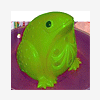15 hours ago, Duvel said:I usually buy Hinode. It is one of the more economic brands and I used to buy it when I was living in Japan, so I kept the habit. I have another (more fancy) one down in my cellar which came in a care package from a dear Japanese friend, but I haven’t gotten to try it yet.
I actually did a little more research, and it sure appears as if one of, if not the main reason that salt appears in that Ohsawa Mirin, as well as in the Eden Foods brands mirin imported from Japan (which is also highly touted and which I also bought) has to do with changing it from an alcoholic beverage (i.e. wine) into a cooking product (i.e. cooking wine). And that, in turn, has to do with taxes and other bs. Here in the US, obviously.
For instance, on this website Cooking With Yoshiko:
QuoteGenuine mirin contains approximately 14% alcohol but to avoid alcohol tax, small amount of water and salt are added for cooking mirin.
And on this one, Dreams of Dashi:
QuoteMirin (みりん、味醂). This sweet rice wine comes in 3 types. The best is hon-mirin, which means true mirin. The wine is naturally sweet from the fermentation and has an alcohol content of 14%. It should only contain 3 ingredients: rice, koji and shochu (Japanese distilled alcohol). It is nearly impossible to find this variety in the US even if the label says hon-mirin. The second best option is ajino-haha mirin which is a respectable substitute for hon-mirin. The brewing process is the same, but salt is added to be considered cooking wine. Eden Foods Mirin is your best bet but it can be pricey.
I guess, in a way, this is all similar to the Chinese cooking wines sold in the grocery stores here. Even though it's called Shaoxing wine (and comes in bottles which look exactly the same as the real stuff), the Shaoxing sold in grocery stores includes the addition of salt; however, because of where I live, I'm able to go to liquor stores all over Chinatown and buy the real stuff. Also much more expensive than the grocery store product.
11 hours ago, KennethT said:I know it's a hike, but what about Mitsuwa?
If I ever get there again, sure. Love the place. And of course, the rules about ordering alcohol on line are cray cray too!




